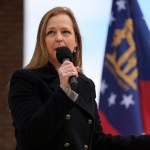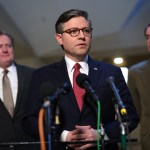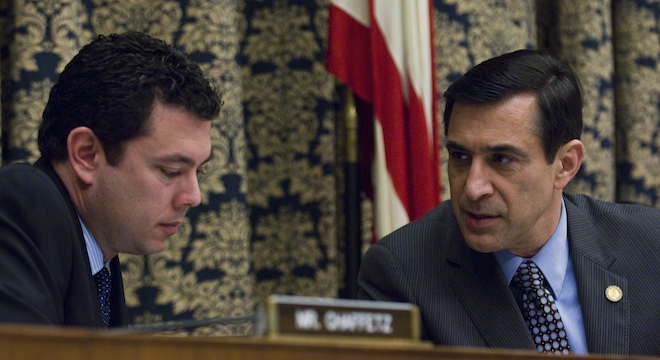Updated 6 pm ET Saturday, December 17
Shortly after the marathon second hearing on the “Stop Online Piracy Act” was adjourned Friday afternoon, opponents of the bill began claiming (temporary) victory.
Popular social news website Reddit, the Progressive Campaign Change Committee and Net Coalition, a group representing leading Web companies including Google, Yahoo and Amazon, all sent out messages welcoming the temporary delay in moving the bill forward.
Now, the House is unlikely to touch SOPA until January 17, 2012, the next calendar date that the House is in session, although it could restart the markup hearing as early as next week, depending on what congressional leadership decides.
“Something could potentially happen next week,” said Rep. Jason Chaffetz (R-UT), the lawmaker arguably singlehandedly responsible for stopping the SOPA hearing dead in its tracks by convincing the bill’s sponsor and the leader of the hearings, House Judiciary Chairman Rep. Lamar Smith (R-TX), to adjourn the markup hearing and consider holding additional cybersecurity hearings on the bill.
“If the leadership decides, we could come into sessions next week,” Chaffetz told TPM in a telephone interview, “I don’t know what’s going to happen with the holidays coming up, but we’re not supposed to be back in session until January 17.”
Still, there could be little denying that Chaffetz and his fellow lawmakers opposed to the current bill struck a critical, if temporary, victory on Friday by delaying the House Judiciary Committee from voting to move the bill out of committee and into consideration by the full House.
But their win was hard, and long fought: The standard markup hearing that began Thursday, dragged on mercilessly for nearly 15 hours over two days, and was full of bipartisan bickering over Web semantics and technical terminology, before Chairman Lamar Smith finally pulled the plug on Friday afternoon, motioning to adjourn around 1:30 pm ET.
During that time, only 25 out of upwards of 50 amendments brought up primarily by SOPA’s legislative critics — namely Reps. Chaffetz, Zoe Lofgren (D-CA), Darrell Issa (R-CA), Sheila Jackson-Lee (D-TX) and Jared Polis (D-CO) — were voted upon, and most of them shot down by a core group of 22 SOPA supporters in the chamber.
At one point on Thursday, the hearing was stalled due to the unintentionally ironic spat over one representative’s use of Twitter to disparage another during the course of the hearing itself.
But while the final outcome was a surprise, the glacially slow pace of the hearing wasn’t totally unexpected. Faced with rising and increasingly public dissent drummed up by a 70-member coalition of Web companies and advocacy groups — including Google, Facebook, Tumblr, Demand Progress, Public Knowledge, the Progressive Campaign Change Committee and the Cato Institute, to name just a few — the bill’s architect, Smith, conceded on early Thursday morning ahead of the hearing that it might extend beyond a single day.
“[W]hile I am hopeful that the bill will be approved on Thursday, the committee is prepared to extend the markup into Friday,” Smith told Politico.
Obviously, that didn’t happen. But Smith was still quick to point out following the hearing that while slow, the tide was obviously in his favor, releasing a statement to the following effect:
“I am pleased that the unfounded claims of critics of the Stop Online Piracy Act have overwhelmingly been rejected by a majority of House Judiciary Committee members. Members consistently voted by a 2-1 margin to defeat amendments that would have made it more difficult to stop the problem of counterfeit products and online theft of America’s intellectual property. The Committee consistently rejected proposals that would have made it harder to protect American jobs and American innovators.
And even stalwart SOPA-critic Rep. Zoe Lofgren (D-CA) conceded to a supportive audience on Reddit’s “ask me anything” pages that it would be difficult to stop SOPA from getting passed in some fashion or another.
“If I had to bet right now (no, not a $10,000 bet!) I would guess that SOPA proponents currently have the upper hand in Congress,” Lofgren wrote on Reddit. “But that is because you have not yet been heard from fully yet. That is very much subject to change.”
Still, Reddit and the Progressive Change Campaign Committee savored the news of the markup hearing’s delay, posting the following message on the website of their online petition that they said gathered 97,000 signatures against SOPA in the 36 hours ahead of the hearing:
VICTORY! Because of immense public pressure, the House Judiciary Committee cancelled their vote on the bill that would kill Internet innovation and free speech — and adjourned for the rest of the year!
The Internet fought back to protect the Internet — and we won, for now. We have to assemble our Internet army for next year, when this bill will come up again.
NetCoalition’s statement following the hearing was more subdued, but no less clear in its delight that the legislation’s forward progress had been impeded. As, Markham Erickson the group’s executive director, wrote:
It is clear from the last two days that the House Judiciary Committee is genuinely struggling with the serious, complicated and highly technical issues raised by the Stop Online Piracy Act (SOPA). NetCoalition is encouraged that Chairman Smith is considering the requests of many on the Committee that additional hearings be conducted, particularly on the issue of Internet security, in order that the Committee be fully briefed on the potentially serious and negative consequences that the proposed legislation would create.
Members of the Committee deserve recognition for their hard work and many hours of discussion and debate around the various issues raised by SOPA, and we appreciate their commitment to working further to find a meaningful and effective solution for the genuine problems created by foreign rogue websites.
NetCoalition looks forward to working with Members and Committee staff as these discussions move forward.
Broadly speaking, SOPA would give the Attorney General the power to seek a court order to force American Web companies and payment providers to cut off ties with foreign-based domains accused of hosting or “facilitating” pirated content by copyright holders, namely Hollywood, the recording industry and the pharmaceutical industry.
It is also worth pointing out that SOPA is but one of several pieces of legislation introduced by Congress designed to crack down on online piracy. A sister bill, the PROTECT IP Act, was introduced to the Senate by Sen. Patrick Leahy (D-VT) in May 2011, but put on hold by Sen. Ron Wyden (D-OR), who, along with Rep. Darrell Issa, has introduced another anti-piracy bill, the OPEN Act, aiming to include the input of Web companies and users
from the onset. A copy of the bill that can be edited by anyone has been posted online here.
That act, which would shift the power to crackdown on piracy away from the Attorney General, as advocated by SOPA, was introduced by Issa during the SOPA hearings but handedly voted down.
Still, with the numerous competing efforts to combat piracy all circulating through Congress in some fashion, 2012 will likely prove to be a decisive year in the government’s regulation of the open Web. Stay tuned.
Late update: As it turns out, Smith sent out an internal communication to the House Judiciary Committee saying he wants the SOPA markup hearing to continue at 9 a.m. on Wednesday, December 21, Politico and PC World report.
However, Smith’s office told TPM that the House still doesn’t know if they will be in session or not next week. If not, the hearing will not take place. We will update when an official announcement has been made. Stay tuned.
Second late update: A reader points out that during Saturday’s session of the Senate, Majority Leader Harry Reid (D-NV) filed a cloture motion to proceed on the PROTECT IP Act, forcing the Senate to consider the bill Tuesday, January 24, 2012.









